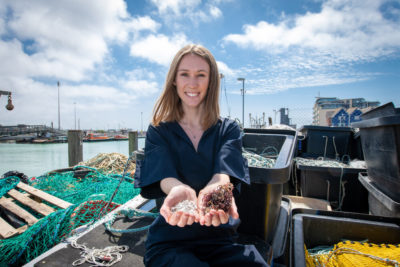Marinatex
A regenerative alternative to plastic
MarinaTex is an innovative, biodegradable plastic-alternative made from the second most abundant biopolymer in nature, found shellfish waste.
A staggering 883 million tonnes of shellfish waste is produced annually—most of which is incinerated, releasing 1kg of CO₂ per kg burned.
Access to University lab space
The MarinaTex team is working with Clean Growth UK’s South East Hub, the University of Brighton, to accelerate product development.
Founder Lucy Hughes needed access to lab space and equipment to test and develop the material. Start-ups like MarinaTex need flexibility and, unlike private labs demanding long-term leases, the University has been able to offer her the perfect balance of access and adaptability.
One product, two markets
MarinaTex has two markets: packaging and agricultural seed coatings.
Recyclable packaging
The material will be trialed in supermarket sandwich boxes, as a coating for the card box and the clear window film. MarinaTex sandwich packs will be recyclable in household paper recycling, because they’ll contain no plastic.
Lucy and her team have been carrying out Moisture Vapour Transition Rate testing in the University’s environmental test chambers, tensile and mechanical testing, and analysis of the material’s chemical properties.
Results from the testing are driving the product development journey and providing robust performance data.
Regenerative seed coatings
Commercial seeds are often coated with synthetic polymer films to improve handling, protect against pests and diseases, and regulate germination. However, these coatings can degrade over time, releasing microplastics into the soil, which may negatively impact soil health and the surrounding ecosystem.
MarinaTex is developing an alternative coating that’s not just biodegradable and compostable, but regenerative. It contains microbes, which promote healthy plant establishment. The coating reduces the need for pesticides and fertilisers and nourishes the soil as it breaks down.
Because the product development journey involved working with microbes, Lucy’s team needed a lab with relevant equipment and health and safety measures in place. Without access to the University’s lab space, the project would’ve hit a roadblock.
The team has been using the lab to grow microbes to integrate into the seed coatings and will be testing the material in the environmental chambers.
Game-changing
Lucy said:
“The University’s facilities have been a game-changer for our R&D. The flexibility and access to specialised equipment has allowed us to speed up innovation and explore product applications requiring microbiology. It’s significantly accelerated our development process.”
Alongside access to lab space and equipment, we’ve also supported MarinaTex with an Innovate UK grant application and our popular Sustainability Storytelling workshop.
